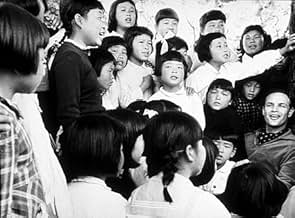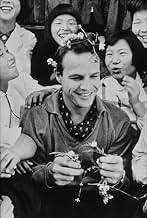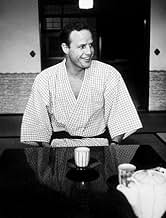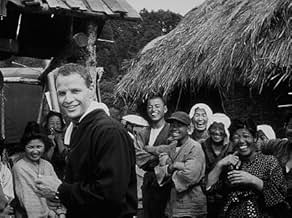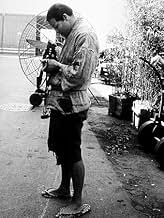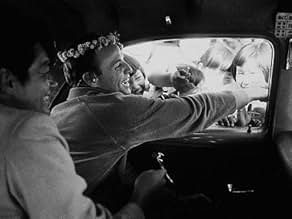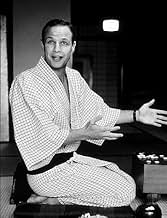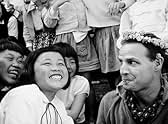IMDb रेटिंग
6.6/10
3.9 हज़ार
आपकी रेटिंग
अपनी भाषा में प्लॉट जोड़ेंIn post-WWII Japan, an American captain is brought in to help build a school, but the locals want a teahouse instead.In post-WWII Japan, an American captain is brought in to help build a school, but the locals want a teahouse instead.In post-WWII Japan, an American captain is brought in to help build a school, but the locals want a teahouse instead.
- पुरस्कार
- 1 जीत और कुल 9 नामांकन
Machiko Kyô
- Lotus Blossom
- (as Machiko Kyo)
Harry Morgan
- Sgt. Gregovich
- (as Henry {Harry} Morgan)
Carlo Fiore
- Soldier
- (बिना क्रेडिट के)
John Grayson
- Soldier
- (बिना क्रेडिट के)
Harry Harvey Jr.
- Soldier
- (बिना क्रेडिट के)
Miyoshi Jingu
- Old Woman on Jeep
- (बिना क्रेडिट के)
Roger McGee
- Soldier
- (बिना क्रेडिट के)
Dansho Miyazaki
- Sumata's Father
- (बिना क्रेडिट के)
Minoru Nishida
- Mr. Sumata
- (बिना क्रेडिट के)
Aya Oyama
- Daughter on Jeep
- (बिना क्रेडिट के)
फ़ीचर्ड समीक्षाएं
Marlon Brando was amazing in this film. I saw the comments made on TCM before they started the film and they said he saw the stage play and begged Paramount (?) to let him have a part in it when they made the film. They said he could have any part he wanted and he picked Sakini, the translator. As a Japanese teacher I want to tell you that I was stunned at his perfect accent! He spoke English exactly as a native Japanese person would. If I hadn't been told ahead of time that it was Marlon Brando, there is no way you could have convinced me that it wasn't a native Japanese actor doing the part. I could see that an attempt was made to make the natives look uneducated and doltish, but having lived in Japan for a year and a half, I simply couldn't see them that way. All you have to do is take a few minutes to watch any people and see the intelligence in their eyes and in their mannerisms and you can see how intelligent they really are whether YOU understand their language or not!
I have spent many years on Okinawa and am always amazed at Brando's ability to create a character (Sakini) that is true to the Okinawan character. I have watched it many times over and enjoy it every time. When I'm asked why I visit Okinawa so often, I usually loan them my copy of "Teahouse" and wait for a response. It is a story of a resilient and happy people who have retained their culture, through many invasions. Brando's monologue at the beginning and end of the film masterfully explains it all. The kids will like it and adults should get a laugh while watching the arrogant victors being steered to the Okinawan's needs in a hilarious manner. It's not quite history and it's not quite fantasy, but it's all good fun.
This film made me realize how much we've lost as a country since the 1950s. According to Wikipedia at least, the book, play, and film were enormously popular for about 25 years, when political correctness set in, and liberals were oh-so-terribly aghast at Marlon Brando playing an Okinawan with a heavy accent. But it's Brando's character who is the most admirable in the movie -- sharp, perceptive, and cunning, but also warm, generous, and forgiving.
All told, it's the Okinawans who come off well -- it is we Americans who seem rather ridiculous, with our notions of winning hearts and minds and spreading democracy. Remember that this film was made just ten years after WWII, when we were up against the Soviet Union, and democracy and "the American way" were at the heart of what we thought we were all about. But here is a film that completely satirizes, if not ridicules, all that, and yet it was enormously popular.
Perhaps I'm looking at it through rose-tinted lenses -- there may well have been the Michael Savages and Rush Limbaughs of the day who inveighed against the Hollywood liberals seeking to undermine American resolve in the face of the Soviet threat and disgracing the memory of those who had died in WWII.
But I think, more accurately, it was a time of greater American self- confidence, when we were able to laugh at ourselves more easily, and weren't terrified that this, that or another group might be ticked off.
In short, this is a wise movie that should be seen by all those in power who have anything to do with how we conduct ourselves toward other nations and peoples -- as well as anyone who wants to see an entertaining but also educational film.
All told, it's the Okinawans who come off well -- it is we Americans who seem rather ridiculous, with our notions of winning hearts and minds and spreading democracy. Remember that this film was made just ten years after WWII, when we were up against the Soviet Union, and democracy and "the American way" were at the heart of what we thought we were all about. But here is a film that completely satirizes, if not ridicules, all that, and yet it was enormously popular.
Perhaps I'm looking at it through rose-tinted lenses -- there may well have been the Michael Savages and Rush Limbaughs of the day who inveighed against the Hollywood liberals seeking to undermine American resolve in the face of the Soviet threat and disgracing the memory of those who had died in WWII.
But I think, more accurately, it was a time of greater American self- confidence, when we were able to laugh at ourselves more easily, and weren't terrified that this, that or another group might be ticked off.
In short, this is a wise movie that should be seen by all those in power who have anything to do with how we conduct ourselves toward other nations and peoples -- as well as anyone who wants to see an entertaining but also educational film.
For a guy who had some heavy duty roles,Waterfront,Sreetcar etc. this role was a real challenge for Brando and he is fabulous and steals movie although Glenn Ford is great too. This shows Brando's brilliance as an actor not that there was ever any doubt but this early in his career to take this comedic challenge shows his versatility. Is Glenn Ford ever bad? I don't think he gets the credit for all his talent. This movie probably could not be made today a victim of PC. Must have Asian play Asian and don't offend the the Japanese although the only people made to look like fool were the Americans which is fine with me because it's a comedy and people are suppose to look foolish. Never on, but caught on TCM.
In watching "Teahouse of the August Moon," again recently, I can see how it made such a smash on Broadway. Besides its very funny plot and script, the setting seems ideal for a stage. Or, did they move the stage setting to Japan or elsewhere for the movie? I ask that because after three viewings over the years, the thought has stuck in my mind that it seemed like it was on stage. Perhaps the final scene when we see Sakini directing the locals to reassemble the teahouse drove that thought more than anything. I performed and worked in theater at the college level, and it struck me as a beautiful job of a change of sets and scenery.
The further we get away from the 20th century war years, the less humorous some of the spoofs of military management seem to be. I may have found this film much funnier years ago, but it seems to me now to be just OK or good. This is a comedy of situations, not witty dialog. And, its humor derives to a great extent from the variety of characters. But for one, I could have rated it a notch or two higher.
Glenn Ford just does not deliver the humor in his role as Capt. Fisby. He moves between a hapless, seemingly lazy guy who has lots of bad luck, to a frenetic, nervous character who's worried about doing things right. Then, he becomes a very laid back, un-excitable character who doesn't seem like anything will ruffle him. It just doesn't seem to work. The right actor might be able to deliver that, but it doesn't work for Ford. And, that's too bad, because as one of the two main leads, his character is a great part of the film. I know Ford was capable of great acting, but his interpretation for this role misses the mark.
Now, what earns the film seven stars from me are three performances and the local extras. Marlon Brando is excellent as Sakini, Eddie Albert is fantastic as Capt. McLean, and Paul Ford is superb as Col. Purdy. Purdy and McLean are the sources of most of the funny streaks of this film. We see a good contrast in how Albert transforms from the straight-laced psychologist to the giddy gardener. It works beautifully for him, and he is superb in that role. Paul Ford is a wonderful character actor who plays bombastic buffoons with bravado. And, Brando is excellent as the wonderful interpreter whom we know translates things to come out his way. His opening dialog is very good – in Oriental theatre style, he is the narrator who gives the story's background and sets the stage, so to speak.
Films in which white actors play other races draw the ire of some people yet today. If they are derogatory of the race or character, they surely should be criticized. But, otherwise not. Because this is theater (on stage or on film), and that is part of what acting is all about. Making one's self into another character or person, of whatever age, race, physical condition, mental state or appearance – is a hallmark of acting. To aspiring thespians or established actors, the challenge of a different or demanding role is energizing. I played Hsieh Ping-Kuei in a college production of "Lady Precious Stream" by Chinese playwright and director S.I. Hsiung. Mr. Hsiung went to London in 1932 to pursue post- graduate studies of Shakespeare. Shortly after his arrival, he wrote Lady Precious Stream in English, adapting it from his Chinese culture. It was a huge success, running for 1,000 performances in 1935 and 1936 at the People's National Theatre of London. Its cast was all Caucasian, and in 1936 it moved to Broadway in the U.S. where is success continued. It was made into movies in England in 1938 and 1950, adapted by Hsiung, again with Caucasian casts.
I should like to see someone make a movie of "Lady Precious Stream" shot on location with the full original script. It could be with Asians in all the roles, or it could include a mix if one or more Western stars wanted to tackle a Chinese role. I think many Western audiences today would enjoy it immensely. The story is a romantic, sometimes comic, domestic drama set in a time of instability during the Tang Dynasty.
In the meantime, "Teahouse of the August Moon" can entertain as a comic look at U.S. military management in a conquered country whose culture is much different from that of America.
The further we get away from the 20th century war years, the less humorous some of the spoofs of military management seem to be. I may have found this film much funnier years ago, but it seems to me now to be just OK or good. This is a comedy of situations, not witty dialog. And, its humor derives to a great extent from the variety of characters. But for one, I could have rated it a notch or two higher.
Glenn Ford just does not deliver the humor in his role as Capt. Fisby. He moves between a hapless, seemingly lazy guy who has lots of bad luck, to a frenetic, nervous character who's worried about doing things right. Then, he becomes a very laid back, un-excitable character who doesn't seem like anything will ruffle him. It just doesn't seem to work. The right actor might be able to deliver that, but it doesn't work for Ford. And, that's too bad, because as one of the two main leads, his character is a great part of the film. I know Ford was capable of great acting, but his interpretation for this role misses the mark.
Now, what earns the film seven stars from me are three performances and the local extras. Marlon Brando is excellent as Sakini, Eddie Albert is fantastic as Capt. McLean, and Paul Ford is superb as Col. Purdy. Purdy and McLean are the sources of most of the funny streaks of this film. We see a good contrast in how Albert transforms from the straight-laced psychologist to the giddy gardener. It works beautifully for him, and he is superb in that role. Paul Ford is a wonderful character actor who plays bombastic buffoons with bravado. And, Brando is excellent as the wonderful interpreter whom we know translates things to come out his way. His opening dialog is very good – in Oriental theatre style, he is the narrator who gives the story's background and sets the stage, so to speak.
Films in which white actors play other races draw the ire of some people yet today. If they are derogatory of the race or character, they surely should be criticized. But, otherwise not. Because this is theater (on stage or on film), and that is part of what acting is all about. Making one's self into another character or person, of whatever age, race, physical condition, mental state or appearance – is a hallmark of acting. To aspiring thespians or established actors, the challenge of a different or demanding role is energizing. I played Hsieh Ping-Kuei in a college production of "Lady Precious Stream" by Chinese playwright and director S.I. Hsiung. Mr. Hsiung went to London in 1932 to pursue post- graduate studies of Shakespeare. Shortly after his arrival, he wrote Lady Precious Stream in English, adapting it from his Chinese culture. It was a huge success, running for 1,000 performances in 1935 and 1936 at the People's National Theatre of London. Its cast was all Caucasian, and in 1936 it moved to Broadway in the U.S. where is success continued. It was made into movies in England in 1938 and 1950, adapted by Hsiung, again with Caucasian casts.
I should like to see someone make a movie of "Lady Precious Stream" shot on location with the full original script. It could be with Asians in all the roles, or it could include a mix if one or more Western stars wanted to tackle a Chinese role. I think many Western audiences today would enjoy it immensely. The story is a romantic, sometimes comic, domestic drama set in a time of instability during the Tang Dynasty.
In the meantime, "Teahouse of the August Moon" can entertain as a comic look at U.S. military management in a conquered country whose culture is much different from that of America.
क्या आपको पता है
- ट्रिवियाProduction began with Louis Calhern playing Col. Purdy, but Calhern died after more than a month of filming. Paul Ford was quickly recruited, as he had created the role on Broadway, and this resulted a revived career for the lovable, irascible character actor.
- गूफ़While Fisby and Sakini are finishing up their first address to the villagers Sakini asks Fisby what time it is. He responds that it's a quarter to 5:00. But the sun is directly over their heads as if it were noon.
- कनेक्शनFeatured in Okinawa: Keystone of the Pacific (1973)
- साउंडट्रैकSakura Sakura (Cherry Blossoms)
(uncredited)
Written and Arranged by Kikuko Kanai
Sung by Lotus Blossom
टॉप पसंद
रेटिंग देने के लिए साइन-इन करें और वैयक्तिकृत सुझावों के लिए वॉचलिस्ट करें
विवरण
- रिलीज़ की तारीख़
- कंट्री ऑफ़ ओरिजिन
- भाषाएं
- इस रूप में भी जाना जाता है
- Cajdzinica na avgustovskoj mesecini
- फ़िल्माने की जगहें
- उत्पादन कंपनी
- IMDbPro पर और कंपनी क्रेडिट देखें
बॉक्स ऑफ़िस
- बजट
- $39,26,000(अनुमानित)
- चलने की अवधि2 घंटे 3 मिनट
- ध्वनि मिश्रण
इस पेज में योगदान दें
किसी बदलाव का सुझाव दें या अनुपलब्ध कॉन्टेंट जोड़ें

टॉप गैप
By what name was The Teahouse of the August Moon (1956) officially released in India in English?
जवाब

